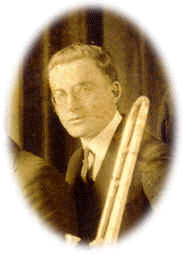 Clarence
Wesley Jones was born in Sherrard, IL on December 15, 1900. He
dropped out of high School at about the age of sixteen. Although Clarence
had grown up in an extremely devote Christian family, he had never made a
personal decision to accept Jesus Christ as his saviour. On October 27,
1918, while listening to the Tabernacle's pastor, Paul Rader, he was
convinced of his need and committed his life to Christ. Clarence
Wesley Jones was born in Sherrard, IL on December 15, 1900. He
dropped out of high School at about the age of sixteen. Although Clarence
had grown up in an extremely devote Christian family, he had never made a
personal decision to accept Jesus Christ as his saviour. On October 27,
1918, while listening to the Tabernacle's pastor, Paul Rader, he was
convinced of his need and committed his life to Christ.
Almost immediately afterwards he enrolled in missionary program of the Moody Bible Institute to prepare himself for fulltime Christian work. For about a year after graduation he assisted the evangelist Charles Neighbor, leading the singing at his meetings and helping to organize events. He married with Katherine Welty in 1924. In 1922 Jones joined the staff of the new church started by Rader, the Chicago Gospel Tabernacle. His first job was as a member of the Tabernacle's brass quartet. He participated with Rader in one of the first religious radio broadcasts in the city and the next year the Tabernacle began regular broadcasts. Jones eventually became director of the Tabernacle's radio programming. He also developed a program for boys called the Tabernacle Scouts (which became a precursor of the Awana program for children), managed the Tabernacle's summer campground in Lake Harbor, MI (which later became the Maranatha campground), and was a key member of the Tabernacle's musical staff. While attending the summer conference at Lake Harbor in 1928, Jones received a call to be a missionary in South America. Katherine received a similar call at the same meeting. That same year he took a trip to Venezuela and Columbia to investigate the possibilities of starting a radio station there that would broadcast evangelistic messages and music. Nowhere did he find much encouragement, either from governments or missionaries. He returned to the United States, still determined to find a way to begin a station. He completed his high school education and studied various courses in university. In 1930 the Jones met two American Christian and Missionary Alliance (CMA) workers in Ecuador home on furlough. With their help, he managed to get a license and a 25 year contract to broadcast government programming in Ecuador. At that time, there were very, very few radio receivers in Ecuador. When he arrived in Guayaquil, Ecuador, Jones made arrangements with local businessmen that would import and sell radios and he would provide programming. Jones then moved on to Quito, where he made preparations for the new station. The station was assigned call letters HCJB. It was decided that in Spanish these would stand for Hoy Christo Jesus Bendice (Today Jesus Christ Blesses) and in English Heralding Christ Jesus' Blessings. The first broadcast went on the air Christmas Day, 1931. Beginning in 1933, HCJB began holding frequent remote broadcasts from various locations around the country using a sound truck. This aspect of the station's work was called Radio Rodante. Jones soon became a well-respected figure in Quito, not only because of his services to the country through his radio broadcasting but also because he began teaching English classes for the children of high class Ecuadorians. On a visit to the United sates in April 1944, he convened a meeting of other missionary broadcasters, a conference that resulted in the formation of the World Conference on Missionary Radio (later renamed International Christian Broadcasters or ICB). This was a service organization for the dozens of missionary radio stations that had sprung up around the world, inspired in part by Jones example. In 1946 Jones held Summer Schools of Christian Radio in various parts of the USA, the beginning of many seminars on Christian broadcasting which Jones would hold in various parts of the world. He also began to receive recognition among Protestant Evangelicals and Fundamentalists in the United States for his pioneering work. Clarence and Katherine officially retired to a home in Largo, FL in 1970, but they continued to travel for the mission and Jones continued in demand as a speaker. In 1975, the National Religious Broadcasters made him their first inductee in the Religious Broadcasters Hall of Fame. He died in Largo on April 29, 1986. <information from www.wheaton.edu/bgc/archives/exhibits/cgt/rader08xtra05.html
(photo), www.wheaton.edu/bgc/archives/GUIDES/349.htm#3>
|